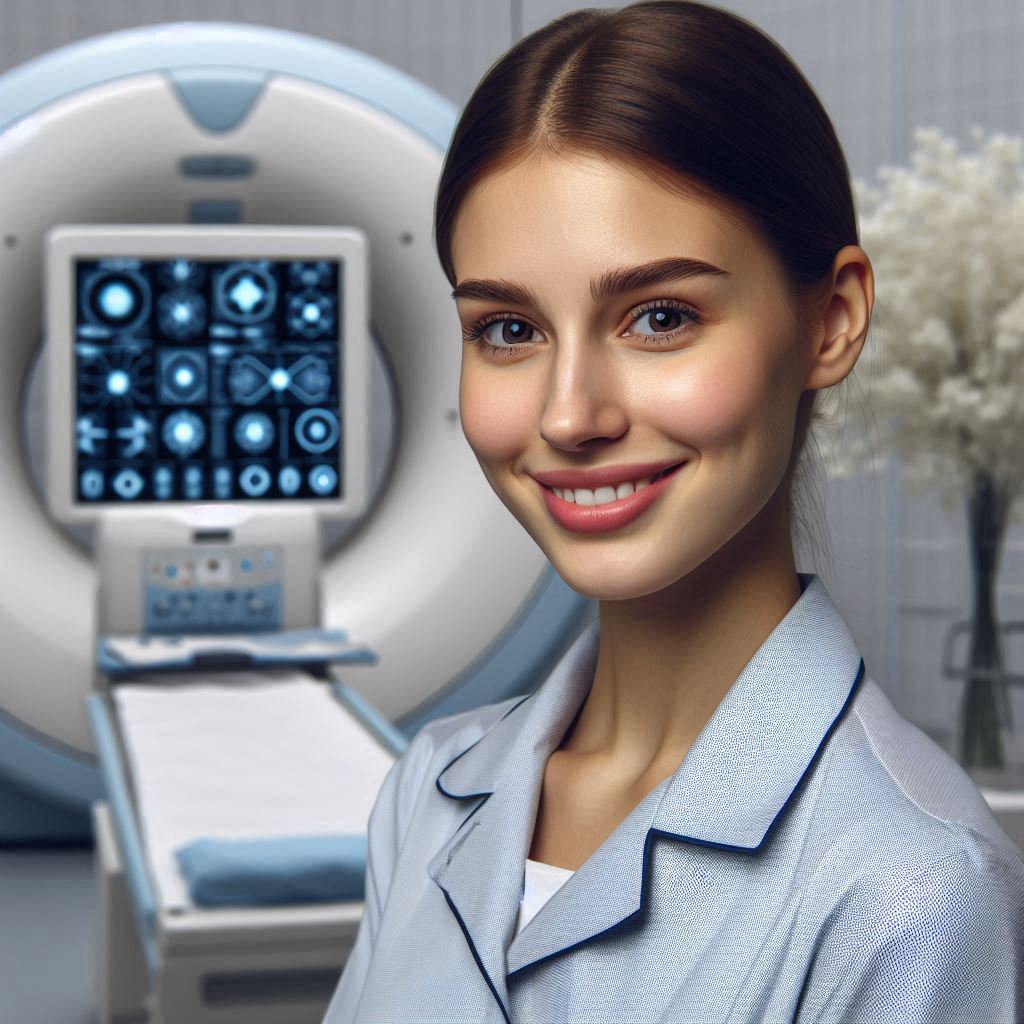Introduction
A sleep technologist is responsible for monitoring and analyzing sleep patterns and behaviors.
These professionals play a crucial role in diagnosing and treating various sleep disorders.
They work closely with patients to conduct sleep studies and provide accurate data.
Sleep technologists use specialized equipment to monitor brain activity, breathing patterns, and more.
They analyze the data collected during sleep studies to identify potential sleep disorders.
Based on their findings, sleep technologists collaborate with healthcare providers to develop treatment plans.
They may also educate patients on proper sleep hygiene and lifestyle changes to improve sleep quality.
Sleep technologists ensure that patients are comfortable and safe during sleep studies.
They have a keen eye for detail and are able to interpret complex sleep patterns accurately.
In addition, sleep technologists play a key role in research studies focused on sleep disorders.
Overall, sleep technologists are essential in helping individuals achieve better sleep and overall well-being.
Education and Training
Required Credentials for Sleep Technologists
Becoming a sleep technologist requires certification from the Board of Registered Polysomnographic Technologists (BRPT).
To earn the Registered Polysomnographic Technologist (RPSGT) credential, candidates must pass an exam.
This certification validates proficiency in conducting and analyzing sleep studies.
Types of Degrees and Programs Available for Aspiring Sleep Technologists
Aspiring sleep technologists typically pursue an associate’s degree in polysomnography or a related field.
These programs provide comprehensive training in sleep study techniques, patient care, and sleep disorder management.
Some universities offer bachelor’s degrees in sleep health or polysomnography for those seeking advanced education.
Continuing Education Requirements
Continuous education is essential for sleep technologists to maintain certification and stay updated with advancements in the field.
The Board of Registered Polysomnographic Technologists requires technologists to earn Continuing Education Credits (CECs) every five years to renew their certification.
These credits can be obtained through workshops, seminars, online courses, and conferences.
Staying current with evolving technologies and treatment methods ensures sleep technologists deliver the highest standard of care.
Ongoing education also enhances their skills in data analysis, patient interaction, and equipment operation.
This knowledge enables technologists to adapt to changes in sleep medicine and provide effective diagnosis and treatment for patients.
Transform Your Career Today
Unlock a personalized career strategy that drives real results. Get tailored advice and a roadmap designed just for you.
Start NowIn summarize, becoming a sleep technologist requires BRPT certification and completing an accredited polysomnography or sleep health degree program.
Continuous education is crucial for maintaining certification and staying abreast of developments in sleep medicine.
By meeting these requirements, sleep technologists ensure they’re prepared to enhance patients’ sleep quality and overall well-being with specialized expertise.
Job Duties
Conducting Sleep Studies to Diagnose Sleep Disorders
Your primary responsibility is conducting sleep studies. This involves preparing patients for overnight polysomnography tests.
You ensure equipment is calibrated and functioning properly for accurate data collection.
Monitoring Patient During Sleep Studies
During sleep studies, you closely monitor patients. Observing sleep patterns, breathing, and brain activity is essential.
Your vigilance ensures comprehensive data collection and precise observation of sleep stages.
Analyzing Data Collected During Sleep Studies
After conducting sleep studies, you analyze collected data. You interpret sleep patterns, respiratory events, and other metrics.
Your detailed analysis provides critical insights into diagnosing sleep disorders accurately.
Collaborating with Physicians to Develop Treatment Plans
Collaboration with physicians is integral to your role. You discuss findings and contribute insights to treatment plans.
Recommendations may include therapies like CPAP for sleep apnea or behavioral interventions for insomnia.
Effective communication with patients is also vital. You explain procedures, answer questions, and alleviate concerns.
Ensuring patient comfort throughout the study promotes accurate data collection and enhances overall patient experience.
Maintaining detailed records and adhering to strict protocols is crucial. This ensures accuracy, consistency, and compliance with healthcare regulations.
Quality assurance measures uphold standards of care and patient safety.
Continuous professional development is essential in your field.
Staying updated with advances in sleep medicine and technology enhances your skills and knowledge.
Attending workshops and conferences further improves patient care and supports your professional growth.
In summary, as a sleep technologist, your responsibilities are diverse and pivotal in improving patients’ sleep health.
From conducting sleep studies and monitoring patients to analyzing data and collaborating with physicians.
Your contributions are integral to diagnosing and treating sleep disorders effectively.
Your commitment to accuracy, ongoing professional development ensures quality care and optimal outcomes for patients seeking better sleep.
Read: Work Environment for Surgical Technologists: Hospitals vs. Clinics
Equipment Knowledge
Familiarity with Various Equipment Used in Sleep Studies
Sleep technologists are extensively trained in utilizing a variety of equipment essential for conducting sleep studies, such as polysomnography (PSG) machines.
These machines are pivotal in monitoring and recording multiple physiological parameters during sleep, including brain waves, respiratory patterns, and movement.
Mastering the operation of PSG machines involves setting up electrodes and sensors on patients to accurately capture sleep data.
Technologists ensure the equipment is calibrated correctly to record precise measurements throughout the night.
They monitor the quality of signals and adjust settings as necessary to maintain reliable data collection.
Beyond PSG machines, sleep technologists may also work with equipment like actigraphy devices, which track sleep-wake patterns over extended periods.
These devices use accelerometers to detect movement and provide insights into sleep efficiency and circadian rhythms.
Ability to Troubleshoot Technical Issues with Equipment
Troubleshooting technical issues is a critical aspect of a sleep technologist’s role.
Despite meticulous preparation, equipment malfunctions can occur during sleep studies.
Technologists must swiftly diagnose issues such as sensor disconnections, software glitches, or electrical disturbances that may disrupt data acquisition.
Transform Your LinkedIn into a Job Magnet
Picture recruiters reaching out to you daily. We craft personalized LinkedIn profiles that stand out, boosting your visibility in ways others can't. Elevate your career now.
Upgrade NowTheir expertise in troubleshooting extends to interpreting error codes, conducting diagnostic tests, and implementing solutions promptly.
This troubleshooting proficiency ensures minimal interruption to the sleep study process.
Allowing technologists to maintain the continuity and accuracy of data collection.
Ensuring Equipment Is Properly Calibrated and Maintained
Proper calibration and regular maintenance are fundamental to the functionality and reliability of sleep study equipment.
Sleep technologists adhere to stringent protocols to calibrate electrodes, sensors, and other components before each study.
This meticulous calibration process ensures that signals are accurately recorded and interpreted.
Routine maintenance tasks include cleaning electrodes, replacing worn-out sensors, and updating software to optimize equipment performance.
Technologists follow manufacturer guidelines and safety standards to uphold the integrity of data collected and ensure patient safety throughout the study.
In general, sleep technologists’ proficiency with sleep study equipment, is pivotal in accurately diagnosing and treating sleep disorders.
Their ability to troubleshoot technical issues swiftly and maintain equipment calibration ensures reliable data collection and enhances patient care.
By upholding high standards in equipment operation and maintenance.
Sleep technologists contribute to improving sleep quality and overall health outcomes for individuals experiencing sleep disorders.
Their dedication to technical proficiency underscores their commitment to delivering exceptional care in sleep medicine.
Read: The Role of Technology in Modern Sonography

Patient Care
Providing Care and Support to Patients During Sleep Studies
Your primary focus is on providing care and support during sleep studies. You ensure patients feel comfortable and informed throughout the process.
Addressing their concerns and answering questions promptly enhances their experience.
Addressing Any Concerns or Questions Patients May Have
Patients may have concerns or questions about the sleep study procedure. You listen attentively and provide clear explanations.
Addressing their concerns alleviates anxiety and promotes cooperation during the study.
Ensuring Patient Comfort and Safety Throughout the Sleep Study Process
Ensuring patient comfort and safety is paramount during sleep studies. You meticulously set up equipment and adjust settings to optimize comfort.
Monitoring patients closely ensures their well-being throughout the night.
Your dedication to providing compassionate care contributes to a positive experience for patients undergoing sleep studies.
Effective communication, attentiveness to patient needs, and maintaining a supportive environment are essential aspects of your role.
Recording accurate observations and data is crucial. Your detailed documentation aids in accurate diagnosis and treatment planning by physicians.
Adhering to protocols and maintaining high standards of care ensures reliable results and patient safety.
Continuous training and professional development enhance your ability to provide excellent patient care.
Staying informed about advancements in sleep medicine and technology equips you with the latest knowledge and skills.
This ongoing education supports your commitment to delivering exceptional care.
Therefore, as a sleep technologist, your role involves not only conducting sleep studies but also providing compassionate care and support to patients.
Addressing concerns, ensuring comfort, and prioritizing safety contribute to a positive patient experience.
Your dedication to patient-centered care and ongoing professional growth ensures optimal outcomes in diagnosing and managing sleep disorders effectively.
Read: Benefits of a Career as an Ultrasound Technician
Documentation and Reporting
Accurate Documentation of Findings During Sleep Studies
Accurate documentation is crucial for sleep technologists to record and analyze findings from sleep studies effectively.
During the study, technologists meticulously document sleep stages, respiratory events, and other physiological parameters.
They annotate significant observations such as arousals, limb movements, and abnormal breathing patterns.
Craft a Resume That Tells Your Story
At American Profession Guide, we craft resumes and cover letters that tell your unique professional story. Stand out with documents tailored to your industry and showcase your strengths to land your dream job.
Email UsThis detailed documentation ensures comprehensive assessment and interpretation of sleep data.
Technologists use standardized scoring systems to classify sleep stages and quantify sleep-disordered breathing events.
Accurate documentation supports precise diagnosis and treatment planning for patients with sleep disorders.
Communicating Results to Physicians in a Timely Manner
Timely communication of sleep study results is essential for facilitating prompt diagnosis and treatment decisions.
Sleep technologists collaborate closely with sleep medicine physicians to relay findings immediately after completing the study.
They discuss significant observations, abnormalities, and patient responses during the night.
Effective communication ensures that physicians receive comprehensive information to formulate accurate diagnoses and develop tailored treatment plans.
Technologists provide context and interpretation of data, assisting physicians in making informed clinical decisions for patient care.
Keeping Detailed Records of Patient Information and Treatment Plans
Maintaining detailed records is a critical responsibility of sleep technologists throughout patient care.
They document comprehensive patient information, including medical history, sleep symptoms, and previous treatments.
Technologists record specific details of each sleep study, including equipment settings, environmental conditions, and patient responses.
These detailed records serve as valuable references for ongoing patient monitoring and treatment adjustments.
Technologists update treatment plans based on sleep study outcomes and patient progress, ensuring continuity of care.
Accurate record-keeping supports collaborative care among healthcare providers and promotes effective management of sleep disorders.
Most Importantly, sleep technologists play a vital role in documenting and communicating findings from sleep studies.
Their meticulous documentation ensures thorough analysis and interpretation of sleep data.
Facilitating accurate diagnosis and personalized treatment for patients.
Timely communication with physicians and detailed record-keeping contribute to comprehensive patient care and continuous improvement in sleep medicine practices.
By upholding high standards in documentation and communication.
Sleep technologists enhance the quality of care and outcomes for individuals with sleep disorders.
Read: Ultrasound Technician vs. Radiologic Technologist
Compliance and Regulations
Following All Relevant Regulations and Protocols in Conducting Sleep Studies
Your role requires strict adherence to healthcare regulations and established protocols.
By following guidelines set forth by organizations like the American Academy of Sleep Medicine (AASM).
American Association of Sleep Technologists (AAST), you ensure the accuracy and reliability of sleep study data.
These protocols include proper setup and calibration of equipment.
Standardized procedures for monitoring physiological signals during sleep, and meticulous documentation of findings.
Compliance with regulations not only ensures patient safety but also upholds the integrity of sleep medicine practices.
It allows for consistent evaluation and treatment of sleep disorders, contributing to improved patient outcomes and overall health.
Ensuring Patient Confidentiality and Privacy
Respecting patient confidentiality and privacy is fundamental to your practice.
Upholding the Health Insurance Portability and Accountability Act (HIPAA) guidelines, you handle sensitive patient information with the utmost care and discretion.
This includes maintaining secure records, restricting access to authorized personnel only, and obtaining patient consent for data sharing as needed.
By safeguarding patient confidentiality, you foster trust and promote a supportive environment for patients seeking sleep disorder evaluation and treatment.
Your commitment to ethical conduct reinforces the integrity of the healthcare profession and enhances patient satisfaction.
Staying Up-to-Date on Best Practices and Industry Standards in Sleep Technology
Continuous professional development is crucial in the dynamic field of sleep technology.
Staying informed about advancements in sleep medicine, technological innovations, and industry standards allows you to deliver state-of-the-art care.
Attending conferences, workshops, and continuing education courses enables you to expand your knowledge and skills.
You learn about new diagnostic tools, treatment modalities, and research findings that shape best practices in sleep technology.
Integrating these advancements into your practice enhances diagnostic accuracy, treatment effectiveness, and patient care experiences.
Your dedication to staying current with industry standards not only benefits patients but also contributes to the advancement of sleep medicine as a whole.
By embracing innovation and maintaining high professional standards.
You play a vital role in improving sleep health outcomes and supporting the well-being of your patients.
In essence, as a sleep technologist, your commitment to following regulations.
Protecting patient privacy, and advancing your knowledge ensures ethical practice and excellence in patient care.
By upholding standards and embracing continuous learning.
You contribute to the evolution of sleep technology and enhance the quality of life for individuals affected by sleep disorders.
Conclusion
As we’ve discussed, sleep technologists play a crucial role in diagnosing and treating sleep disorders.
Their expertise is essential in helping patients achieve better sleep quality and overall health.
It’s important to highlight the diverse responsibilities and skills required for this job.
Sleep technologists must be knowledgeable in various sleep disorders.
Proficient in using sleep monitoring equipment, and possess strong communication and analytical skills.
For those who are interested in pursuing a career as a sleep technologist, it’s a rewarding field with the opportunity to make a real difference in patients’ lives.
By helping individuals identify and address their sleep issues, sleep technologists contribute to better health outcomes and improved quality of life.
If you have a passion for helping others, are detail-oriented, and enjoy working in a healthcare setting.
Becoming a sleep technologist could be a fulfilling career choice.
Embrace the challenge, continue learning, and make a positive impact on the field of sleep medicine.





